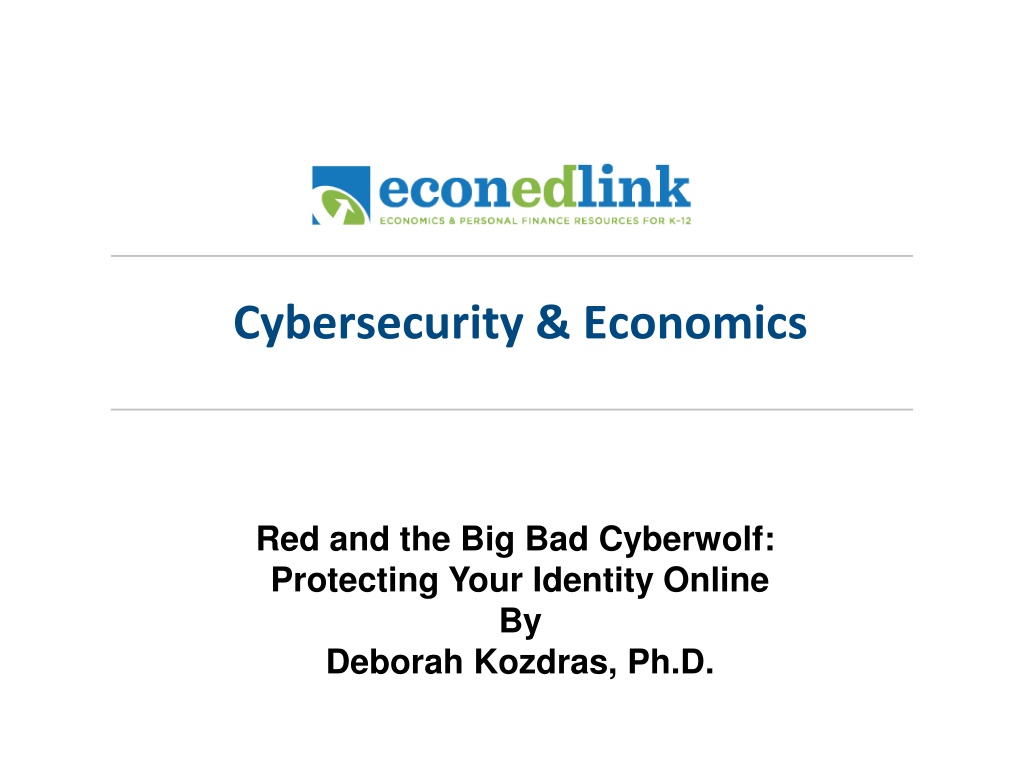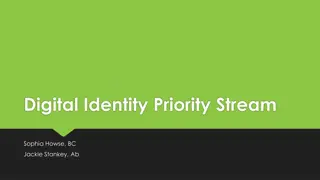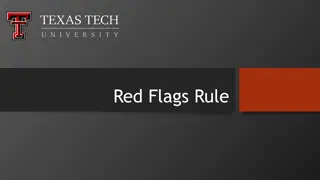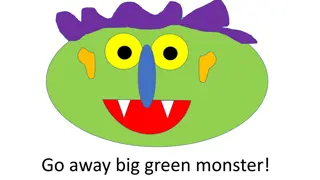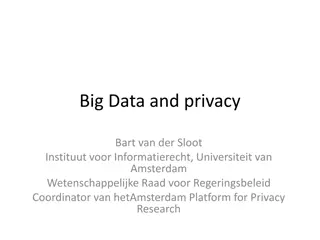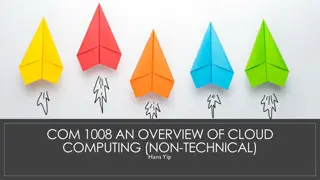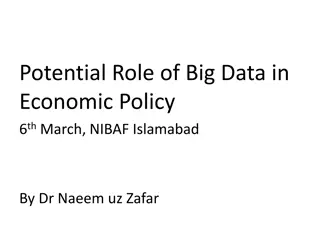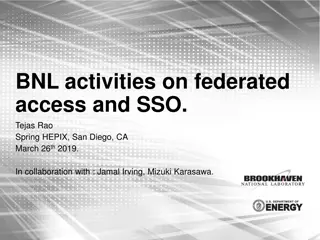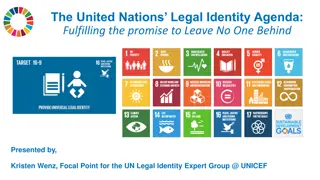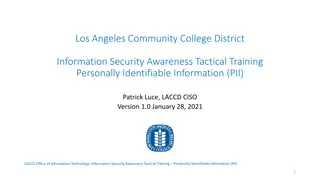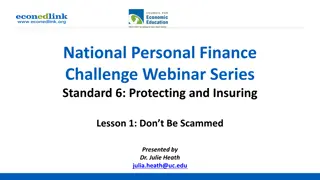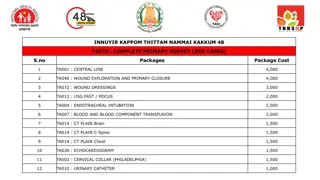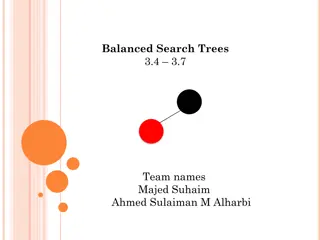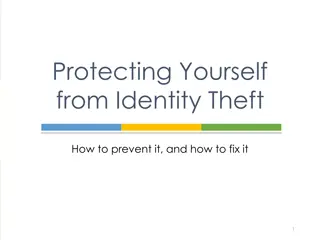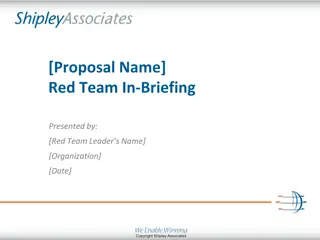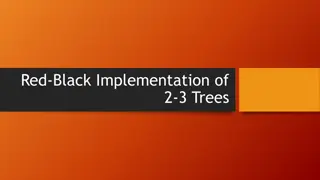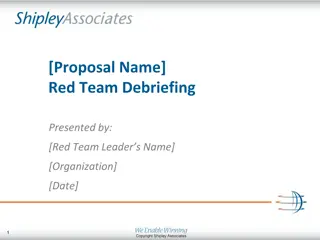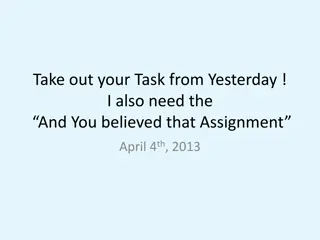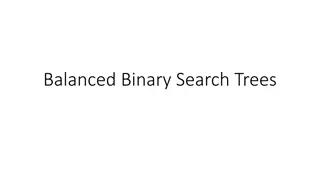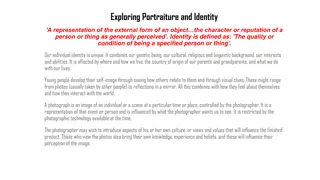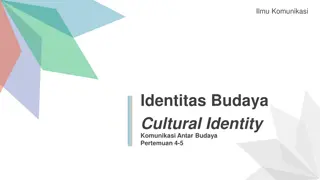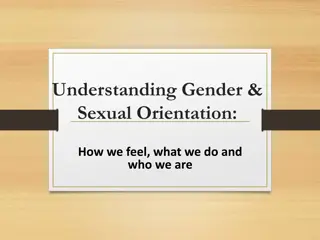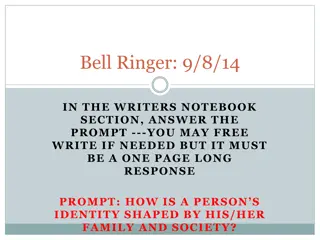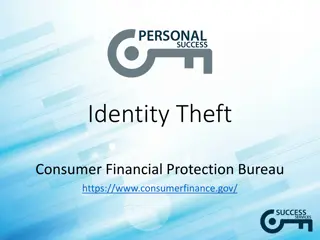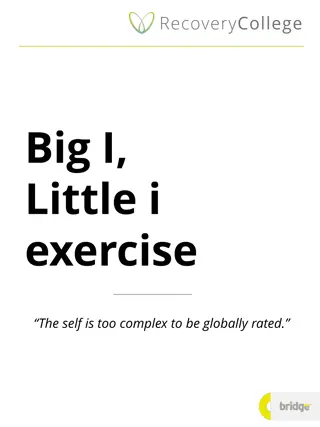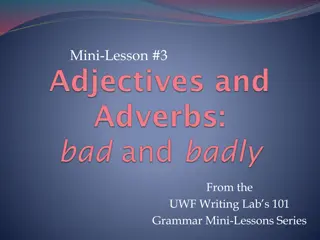Protecting Your Identity Online: Red and the Big Bad Cyberwolf
This content explores the importance of safeguarding your identity online through the story of Red and the Big Bad Cyberwolf. It touches on how individuals can portray themselves differently online, the risks of interacting with strangers in cyberspace, and the need to be cautious when sharing personal information. The narrative emphasizes the significance of being mindful of one's online presence to ensure online safety.
Download Presentation

Please find below an Image/Link to download the presentation.
The content on the website is provided AS IS for your information and personal use only. It may not be sold, licensed, or shared on other websites without obtaining consent from the author. Download presentation by click this link. If you encounter any issues during the download, it is possible that the publisher has removed the file from their server.
E N D
Presentation Transcript
Cybersecurity & Economics Red and the Big Bad Cyberwolf: Protecting Your Identity Online By Deborah Kozdras, Ph.D.
Visual 1: Online Profiles Profile 2 Profile 1 I am a ten-year old boy. I play soccer and tennis. I like to meet people online and play games. My favorite food is bacon. I am a girl and I just turned nine. My favorite thing to do is play Minecraft. On weekends, I visit my grandma and aunt and bring them cookies. How would these people look, based on their profiles? Red and the Big Bad Cyberwolf: Protecting Your Identity Online www.EconEdLink.org 2
Visual 2: Picture of Wolf How different is this from how you saw people based on the online profiles? When you are online, you never know whether people are telling the truth about their identities. Just like the wolf pretended to be Little Red s grandma, adults can pretend to be a child online. Red and the Big Bad Cyberwolf: Protecting Your Identity Online www.EconEdLink.org 3
Handout 1: Letter from Red Hi Students, My name is Red and my friend Jack, the beanstalk guy, told me I should email you. Do you remember the story of my grandma: Little Red Riding Hood. There are a lot of crazy versions of that story out there. Do you want to know what really happened? The Big Bad Wolf was arrested and my grandma was fine. All my life, I ve been warned about the Big Bad Wolf so I NEVER talk to strangers in real life! I m very careful. Jack was over playing online games and apps with me. He said that when I messaged my game friends, I was talking to strangers called cyberstrangers. That s a problem! I always worried about meeting strangers in person, not in cyberspace! He said that there were risks because you never know who might be online. Red and the Big Bad Cyberwolf: Protecting Your Identity Online www.EconEdLink.org 4
Handout 1: Letter from Red (continued) Jack and I have started an afterschool technology club. When my friends and I play online, we especially like to fill in surveys and enter contests. I really like to make new friends and fill in my profiles on the games I play. Jack said there are always costs and benefits to consider when making decisions online. I don t want to do things that are dangerous. I heard you were learning about being safe online. Can you please make some posters or flyers that help kids understand the risks of sharing information with cyberstrangers? Thanks, Red P.S. I no longer wear one of those old-fashioned riding hoods, like my grandma. I prefer wearing red hoodies! Red and the Big Bad Cyberwolf: Protecting Your Identity Online www.EconEdLink.org 5
Handout 2: Part 1 On the Internet, Nobody Knows You Are a Dog (Lexile 930) On the Internet, nobody knows you are a dog is a popular funny meme that has been copied and spread across the web. It started as a cartoon created by Peter Steiner and published in The New Yorker on July 5, 1993. In the cartoon, a dog is sitting on a chair in front of a computer. He is telling another dog on the Internet, nobody knows you are a dog. What do you think he means? Red and the Big Bad Cyberwolf: Protecting Your Identity Online www.EconEdLink.org 6
Handout 2: Part 2 Online Quizzes When you are on the Internet, you never know whether the cyberstranger is as harmless as a dog or as harmful as the Big Bad Cyberwolf. These cyberwolves try to get personal information from you. For example, your friend sends you a link to a quiz: Which fairy-tale character are you? Should you take the quiz? The quiz asks questions about your favorite food, toys, sports, and computer games. It also asks for your name, address, and email address. What are the risks of taking the quiz? Red and the Big Bad Cyberwolf: Protecting Your Identity Online www.EconEdLink.org 7
Handout 2: Part 3 Risks of Sharing Information Sharing private information like your name, address, phone number, and email can be very risky. It can also be risky if you share personal information about your favorite things. Did you know that quiz creators often sell your personal information to companies? Companies use the information you provide (for example, I love to play with American Girl Dolls. ) They will start sending emails about products they think you will like. They will also use the information to place advertisements about your favorite things on websites you visit. In addition, if you share personal information with cyberstrangers, they may use the information to try to meet you. What if a wolf showed up dressed in your favorite sports team s clothing? What are the risks of sharing information? Red and the Big Bad Cyberwolf: Protecting Your Identity Online www.EconEdLink.org 8
Handout 2: Part 4 Online Contests Entering online contests can also be risky. For example, recently Red and Jack were playing an online game and a contest popped up. The contest asked: Do you like to send text messages? Have you ever played on an online game or app? Have you ever entered a contest online? Form for the contest: Email: Name: Where do you go to school? Are you a boy or a girl? Age: Favorite TV show: Favorite app: Favorite singer: Should they enter the contest? Why or why not? What information is very risky to share? What information can be risky? Why? Red and the Big Bad Cyberwolf: Protecting Your Identity Online www.EconEdLink.org 9
Handout 2: Part 5 Information from Contests and Surveys Did you ever think there might be cyberwolves reading the answers you give on surveys and online contests? Contests can collect your information to sell to other companies. Why would other companies want this information? So they can try to sell YOU things. For example, after Red entered the contest, she received emails asking her to buy apps. Then, Jack received a message to fill in a survey with these questions: What is your mother s name? How old are you? What is your favorite snack? Do you live in a house or an apartment? What kind of car do your parents drive? What information could a company find out about someone who answers these questions? Red and the Big Bad Cyberwolf: Protecting Your Identity Online www.EconEdLink.org 10
Handout 2: Part 6 Profiles Red asked her mom if she could fill in a profile on an app. The profile asked for her name, age, address, and school. It also asked for favorite food, sports teams, and music. She filled in all of the information. What are the risks of giving out so much personal information? After she filled in the profile, she received a friend request from Funny Bunny. What should she do? Red and the Big Bad Cyberwolf: Protecting Your Identity Online www.EconEdLink.org 11
Handout 2: Part 7 Conclusion Did you guess it was the Big Bad Cyberwolf disguising himself as a bunny? On the Internet, you don t know the true identity of people. Don t accept friend requests from cyberstrangers. Always ask your parents or guardians first. In addition, protect your identity. Sharing private information can be very risky. However, sharing personal information can also be risky. You are giving information to companies so they can try to sell you things. Remember, you never know who is on the other end of the computer. They can be as harmless as puppies or as hungry as a wolf for your information. So you should always stop and think before you connect. Red and the Big Bad Cyberwolf: Protecting Your Identity Online www.EconEdLink.org 12
Sources Media Smarts: The First Adventure of the Three Cyberpigs http://mediasmarts.ca/game/privacy-playground-first- adventure-three-cyberpigs BuzzFeed Quizzes: What Data Set Do You Belong to? http://www.npr.org/2014/03/01/284338543/buzzfeed- quizzes-what-data-set-do-you-belong-to Stop.Think.Connect: Cybersecurity for Kids https://www.dhs.gov/sites/default/files/publications/Cybe rsecurity%20for%20Kids%20Tip%20Card_1.pdf Red and the Big Bad Cyberwolf: Protecting Your Identity Online www.EconEdLink.org 13
